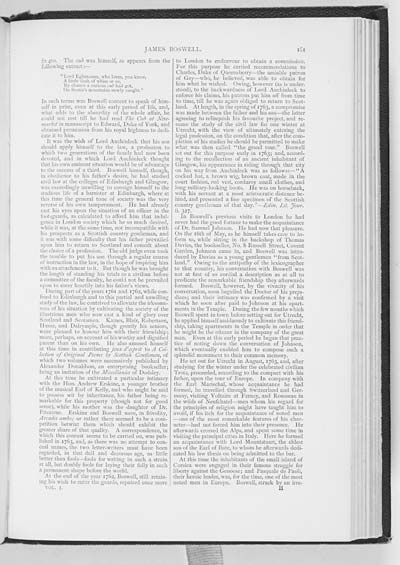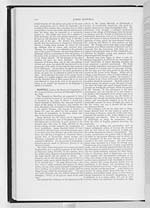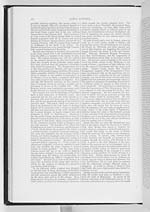i6i
in 4to. The cub was himself, as appears from the
following extract:�
"Lord Eglintoune, who loves, you know,
A little dash of whim or so,
By chance a curious cub had got,
On Scotia's mountains newly caught."
In such terms was Boswell content to speak of him-
self in print, even at this early period of life, and,
what adds to the absurdity of the whole affair, he
could not rest till he had read The Cub at New-
market in manuscript to Edward, Duke of York, and
obtained permission from his royal highness to dedi-
cate it to him.
It was the wish of Lord Auchinleck that his son
should apply himself to the law, a profession to
which two generations of the family had now been
devoted, and in which Lord Auchinleck thought
that his own eminent situation would be of advantage
to the success of a third. Boswell himself, though,
in obedience to his father's desire, he had studied
civil law at the colleges of Edinburgh and Glasgow,
was exceedingly unwilling to consign himself to the
studious life of a barrister at Edinburgh, where at
this time the general tone of society was the very
reverse of his own temperament. He had already
cast his eyes upon the situation of an officer in the
foot-guards, as calculated to afford him that indul-
gence in London society which he so much desired,
while it was, at the same time, not incompatible with
his prospects as a Scottish country gentleman, and
it was with some difficulty that his father prevailed
upon him to return to Scotland and consult about
the choice of a profession. The old judge even took
the trouble to put his son through a regular course
of instruction in the law, in the hope of inspiring him
with an attachment to it. But though he was brought
the length of standing his trials as a civilian before
a committee of the faculty, he could not be prevailed
upon to enter heartily into his father's views.
During part of the years 1761 and 1762, while con-
fined to Edinburgh and to this partial and unwilling
study of the law, he contrived to alleviate the irksome-
ness of his situation by cultivating the society of the
illustrious men who now cast a kind of glory over
Scotland and Scotsmen. Kames, Blair, Robertson,
Hume, and Dalrymple, though greatly his seniors,
were pleased to honour him with their friendship;
more, perhaps, on account of his worthy and dignified
parent than on his own. He also amused himself
at this time in contributing jenx d'esprit to A Col-
lection of Original Poems by Scottish Gentlemen, of
which two volumes were successively published by
Alexander Donaldson, an enterprising bookseller;
being an imitation of the Miscellanies of Dodsley.
At this time he cultivated a particular intimacy
with the Hon. Andrew Erskine, a younger brother
of the musical Earl of Kelly, and who might be said
to possess wit by inheritance, his father being re-
markable for this property (though not for good
sense), while his mother was the daughter of Dr.
Pitcairne. Erskine and Boswell were, in frivolity,
Arcades ambo; or rather there seemed to be a com-
petition betwixt them which should exhibit the
greater share of that quality. A correspondence, in
which this contest seems to be carried on, was pub-
lished in 1763, and, as there was no attempt to con-
ceal names, the two letter-writers must have been
regarded, in that dull and decorous age, as little
better than fools�fools for writing in such a strain
at all, but doubly fools for laying their folly in such
a permanent shape before the world.
At the end of the year 1762, Boswell, still retain-
ing his wish to enter the guards, repaired once more
VOL. I.
to London to endeavour to obtain a commission.
For this purpose he carried recommendations to
Charles, Duke of Queensberry�the amiable patron
of Gay�who, he believed, was able to obtain for
him what he wished. Owing, however (as is under-
stood), to the backwardness of Lord Auchinleck to
enforce his claims, his patrons put him off from time
to time, till he was again obliged to return to Scot-
land. At length, in the spring of 1763, a compromise
was made between the father and his son�the latter
agreeing to relinquish his favourite project, and re-
sume the study of the civil law for one winter at
Utrecht, with the view of ultimately entering the
legal profession, on the condition that, after the com-
pletion of his studies he should be permitted to make
what was then called "the grand tour." Boswell
set out for this purpose early in 1763; and, accord-
ing to the recollection of an ancient inhabitant of
Glasgow, his appearance in riding through that city
on his way from Auchinleck was as follows:�"A
cocked hat, a brown wig, brown coat, made in the
court fashion, red vest, corduroy small clothes, and
long military-looking boots. He was on horseback,
with his servant at a most aristocratic distance be-
hind, and presented a fine specimen of the Scottish
country gentleman of that day."�Edin. Lit. Jour.
ii. 327.
In Boswell's previous visits to London he had
never had the good fortune to make the acquaintance
of Dr. Samuel Johnson. He had now that pleasure.
On the 16th of May, as he himself takes care to in-
form us, while sitting in the backshop of Thomas
Davies, the bookseller, No. 8 Russell Street, Covent
Garden, Johnson came in, and Boswell was intro-
duced by Davies as a young gentleman "from Scot-
land." Owing to the antipathy of the lexicographer
to that country, his conversation with Boswell was
not at first of so cordial a description as at all to
predicate the remarkable friendship they afterwards
formed. Boswell, however, by the vivacity of his
conversation, soon beguiled the Doctor of his preju-
dices; and their intimacy was confirmed by a visit
which he soon after paid to Johnson at his apart-
ments in the Temple. During the few months which
Boswell spent in town before setting out for Utrecht,
he applied himself assiduously to cultivate this friend-
ship, taking apartments in the Temple in order that
he might be the oftener in the company of the great
man. Even at this early period he began that prac-
tice of noting down the conversation of Johnson,
which eventually enabled him to compose such a
splendid monument to their common memory.
He set out for Utrecht in August, 1763, and, after
studying for the winter under the celebrated civilian
Trotz, proceeded, according to the compact with his
father, upon the tour of Europe. In company with
the Earl Marischal, whose acquaintance he had
formed, he travelled through Switzerland and Ger-
many, visiting Voltaire at Ferney, and Rousseau in
the wilds of Neufchatel�men whom his regard for
the principles of religion might have taught him to
avoid, if his itch for the acquaintance of noted men
�one of the most remarkable features of his char-
acter�had not forced him into their presence. He
afterwards crossed the Alps, and spent some time in
visiting the principal cities in Italy. Here he formed
an acquaintance with Lord Mountstuart, the eldest
son of the Earl of Bute, to whom he afterwards dedi-
cated his law thesis on being admitted to the bar.
At this time the inhabitants of the small island of
Corsica were engaged in their famous struggle for
liberty against the Genoese; and Pasquale de Paoli,
their heroic leader, was, for the time, one of the most
noted men in Europe. Boswell, struck by an irre-

![]() Universal Viewer |
Universal Viewer | ![]() Mirador |
Large image | Transcription
Mirador |
Large image | Transcription
![]()

